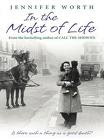
This is a maudlin and poorly written book that makes an unexpectedly good point.
The book is intended to question the way western culture deals with imminent death. The author begins with an account of her grandfather’s death, which happened gently, and at home, and contrasts this with the deaths she frequently saw as a nurse. It is very common apparently for elderly people to end their lives in a great deal of pain, over an extended period, because doctors feel driven by a fear of litigation to extend life, even if only for a few days, by very painful, invasive procedures.
She gives many examples of elderly or terminally ill persons forced through many weeks or even months of great pain because their carers felt unable to simply let the person go gently. Unfortunately, we do not need many examples to understand her case; one or two would have been quite sufficient. As it is, the book degenerates into a rather sentimental, even morbid, succession of stories of people dying in horrible conditions. I’m not going to say I didn’t spend some of the book in tears, but this owes less to the quality of the writing than to the quality of this reader: I am a giant wimp.
I wish the book had involved more examination into how this state of affairs had developed, because where she briefly looks at this it becomes much more interesting. For example, there is some discussion of the fact that in long term care facilities, it is normal for dementia patients to have a feeding tube inserted into their stomachs. You might think this is because they cannot eat, but you’d be wrong. The tubes are inserted because it saves carers fifteen minutes for each patient – they do not have to spoon their food into their mouths, but can just pour it down the tube.
